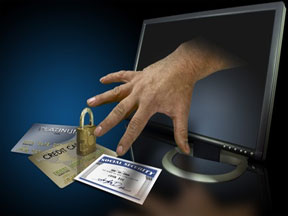10 Habits To Aid PC Security
Aids To PC Security
 These are an assortment of simple steps you can take to ensure your computers security. If everyone adopted these steps as habits much like smoking or gambling, then the internet would be a far cleaner & safer place to go surfing & browsing !
These are an assortment of simple steps you can take to ensure your computers security. If everyone adopted these steps as habits much like smoking or gambling, then the internet would be a far cleaner & safer place to go surfing & browsing !
1. Dont assume anything. Make time to learn about securing your system properly.
2. Always use a reliable antivirus program. Choose an antivirus package that has a consistent track record. Checkmark, AV-Test.org and TuV are among the most respected independent testers of antivirus software. So choose based on their recommendations and not on a pretty coloured box.
3. Always use a reliable firewall solution. Again, independent reviewers are your best source for information on what are reasonable choices. Some operating systems come with a firewall which only filters incoming traffic. Use a firewall that can control both incoming and outgoing Internet traffic, as restricting any unauthorized outgoing traffic can help restrict the effect of any infection your PC may get.
4. Do not open e-mails from unknown or distrusted sources. Many viruses spread via e-mail messages so please ask for a confirmation from the sender if you are in any doubt. Do not become another statistic, please remember the old proverb ” Curiosity Killed The Cat ” & maybe your PC !
5. Do not open the attachments of messages with a suspicious or unexpected subject, or even those from people you know, without first doing a full scan of the attachment by downloading it to your PC and then scan it with an updated antivirus program.
6. Delete any chain e-mails or unwanted messages. Do not join the mindless hordes & forward them or reply to their senders. Any message that states if you don’t forward this to at least “X” number of friends within the next 24 hours, then all manner of plague & pestilence will befall your family & your Grandmother will run off with the local butcher & 2kg of German Salami ! Is talking utter rubbish & any of you that believe such garbage are prime candidates for early retirement in a nice quiet padded room, whilst wearing a very nice tight fitting white jacket. This is considered spam, because it is undesired and unsolicited and it overloads the Internet traffic.
7. Avoid installing services and applications which are not needed on a daily basis. Any services or operations in a desktop role, such as file transfer and file sharing servers, remote desktop servers and the like are potential hazards, and should not be installed if not absolutely necessary.
8. Update your system and applications as often as possible. Some operating systems and applications can be set to update automatically. Make full use of this facility. Failure to apply patches to your system when available, may leave it vulnerable to threats for which fixes already exist.
9. Do not copy any file if you don’t know or don’t trust its source. Check the source of files you download and make sure that an antivirus program has already verified the files at their source. Even if checked at source you should always recheck after downloading to your system & certainly prior to attempting to open the file.
10. Always get into the habit of making regular backups of important personal files such as correspondence, documents, pictures and such like on a regular basis. This will help minimize the effect of any infection your PC may get. Store these copies on removable media such as CD or DVD.
Leave a Reply
You must be logged in to post a comment.